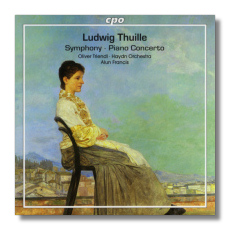
The Internet's Premier Classical Music Source
Related Links
- Latest Reviews
- More Reviews
-
By Composer
-
Collections
DVD & Blu-ray
Books
Concert Reviews
Articles/Interviews
Software
Audio
Search Amazon
Recommended Links
Site News
 CD Review
CD Review
Ludwig Thuille

- Piano Concerto in D Major (1886) [37:16]
- Symphony in F Major (1882) [41:27]
Oliver Triendl, piano
Haydn Orchestra of Bolzano and Trento/Alun Francis
Recorded June 2003/04; Released January 2006
CPO 777008-2 78:47
The reviewer of this disc on the Classicstoday.com website states that "Ludwig Thuille's music is worthless". That's about the most ridiculous assertion I've heard from a reviewer in many a year. Yes, Ludwig Thuille (1861-1907) is better known as a music professor than composer. Yes, his works are entirely derivative and often sound like Schumann with some Mozart, Beethoven and Mendelssohn thrown into the pot. And yes, if you can find some emotional depth in Thuille's music, you deserve an all expense-paid vacation to Tahiti.
But music can be very appealing even if it doesn't break new ground or plumb the depth of the soul. This is where Ludwig Thuille's compositions reside. His music flows in a most natural manner with a strong sense of inevitability. The melodies, although not among the most compelling, are quite catchy and hold their attractiveness well after dozens of listenings. Further, the man was born to write for the piano and its interaction with multiple instruments.
Speaking of the piano, Thuille's Piano Concerto in D Major is a dandy work that would easily win converts in the concert hall. It is easy to enjoy, yet does not wear out its welcome although I initially assumed that a few hearings would leave me saturated. Quite the opposite – additional listenings have only raised my appreciation for the Piano Concerto.
In the typical three-movement setting, the first five minutes of the 1st Movement "Allegro con brio" well demonstrates the fluid nature of Thuille's compositional style replete with a fine mix of tender passages and bravura proclamations. The melodic content of the 1st Movement, although not original, is certainly pleasing to the ear and sticks in the memory bank. However, it is the fluidity that most impresses and reminds me of the typical Mozart piano concerto.
The most beautiful music on the program resides in the 2nd Movement "Adagio sostenuto" with its confident primary theme highlighted by the piano's gorgeous cantabile lines. The movement is also the most overtly romantic on the disc. With the Schumannesque 3rd Movement "Allegro vivace", Thuille offers an exuberant and hard-driving atmosphere mitigated somewhat by a host of lyrical refrains. I do have a couple of minor quibbles; Thuille seems to have never met an arpeggio that he didn't like, and his musical material isn't sufficiently extensive to warrant the over ten minute length of each of the three movements. But overall, the Concerto in D Major is a thoroughly enjoyable work deserving of multiple recordings.
The strengths and weaknesses of the Piano Concerto largely apply to Thuille's Symphony in F Major as well. However, the 2nd and 3rd Movements present additional problems. In the 2nd Movement "Largo maestoso", the funeral-like march is routine in construction, and a few brass fanfares give off a strong aroma of uninspired borrowings. The 3rd Movement "Tempo di Menuetto" has a couple of odd moments centering around the transitions from the Scherzo to the Trio and back; the flow is quite awkward (note track 6 at 2:55 and 4:25). Not having the score in hand, I can't be sure whether the problem rests with the composer or Alun Francis. However, knowing Francis to be a consummate professional, I can't imagine that he would take natural transitions and modify them in an incoherent fashion.
Concerning the performances, Francis and the Haydn Orchestra do a superb job, working up a whirlwind of activity when necessary and bringing out all the poignancy in the scores. Pianist Oliver Triendl is also excellent as he easily negotiates the most difficult passages and arpeggios while offering highly fluid accounts.
Don's Conclusions: Not an essential disc, but one that should give listeners many hours of pleasure. I also have a Thuille disc of piano quintets on AS&V 1171 that I can recommend without any reservations; this might be the best starting point for those new to Thuille's artistry.
Copyright © 2007, Don Satz




















